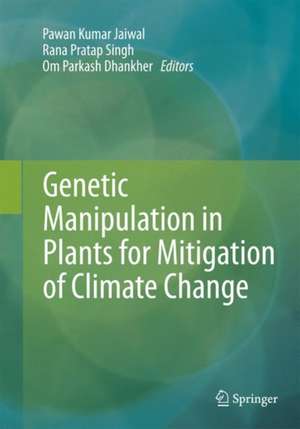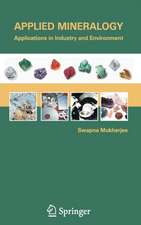Genetic Manipulation in Plants for Mitigation of Climate Change
Editat de Pawan Kumar Jaiwal, Rana Pratap Singh, Om Parkash Dhankheren Limba Engleză Paperback – 30 mar 2018
Food and nutritional security has emerged as a major global challenge due to expanding populations, and cultivated areas becoming less productive as a result of extreme climatic changes adversely affecting the quantity and quality of plants. Hence, there is an urgent need to develop crop varieties resilient to abiotic stress to ensure food security and combat increased input costs, low yields and the marginalization of land.
The role of GM crops in poverty alleviation, nutrition and health in developing countries and their feasibility in times of climate change are also discussed. Recent advances in gene technologies have shown t
he potential for faster, more targeted crop improvements by transferring genes across the sexual barriers. The book is a valuable resource for scientists, researchers, students, planners and industrialists working in the area of biotechnology, plant agriculture, agronomy, horticulture, plant physiology, molecular biology, plant sciences and environmental sciences.
| Toate formatele și edițiile | Preț | Express |
|---|---|---|
| Paperback (1) | 785.36 lei 38-44 zile | |
| Springer India – 30 mar 2018 | 785.36 lei 38-44 zile | |
| Hardback (1) | 807.81 lei 38-44 zile | |
| Springer India – 17 ian 2016 | 807.81 lei 38-44 zile |
Preț: 785.36 lei
Preț vechi: 1033.37 lei
-24% Nou
Puncte Express: 1178
Preț estimativ în valută:
150.27€ • 157.32$ • 124.35£
150.27€ • 157.32$ • 124.35£
Carte tipărită la comandă
Livrare economică 02-08 aprilie
Preluare comenzi: 021 569.72.76
Specificații
ISBN-13: 9788132238096
ISBN-10: 8132238095
Pagini: 241
Ilustrații: XVI, 241 p. 18 illus., 15 illus. in color.
Dimensiuni: 178 x 254 mm
Greutate: 0 kg
Ediția:Softcover reprint of the original 1st ed. 2015
Editura: Springer India
Colecția Springer
Locul publicării:New Delhi, India
ISBN-10: 8132238095
Pagini: 241
Ilustrații: XVI, 241 p. 18 illus., 15 illus. in color.
Dimensiuni: 178 x 254 mm
Greutate: 0 kg
Ediția:Softcover reprint of the original 1st ed. 2015
Editura: Springer India
Colecția Springer
Locul publicării:New Delhi, India
Cuprins
1. Plant responses to tropospheric ozone.- 2. Plant heat stress response and thermotolerance.- 3. Genetic improvement of drought resistance in rice.- 4. Plant breeding for flood tolerance: advances and limitations. 5. Polyamine biosynthesis engineering as a tool to improve plant resistance to abiotic stress.- 6. Enhancing nutrient starvation tolerance in rice.- 7. Engineered Plants for Heavy Metals and Metalloids Tolerance.- 8. Prospects of genetic manipulation for enhanced heavy metal tolerance and bioremediation in relation to climate change.- 9. Biotechnological approaches to mitigate adverse effects of extreme climatic factors on plant productivity.- 10. Anthropogenic increase in carbon dioxide modifies plant-insect interactions.- 11. GM crops for developing world in the era of climate change: for increase of farmer’s income, poverty alleviation, nutrition and health.
Notă biografică
Dr Pawan K. Jaiwal is presently working as a Professor in the Centre for Biotechnology at the M.D. University, Rohtak, India and has served at various administrative positions as the Director, Dean (presently), chairman/ member of statuary bodies at University. He has 30 years of PG teaching and 35 years of research experience and has published about 85 original research papers, 27 book chapters, review articles and 14 books. He has guided over 68 M.Sc. and M. Phil. students for their Dissertations and 20 Ph.D. students for their degree. He is a member of several academic bodies and is in the Editorial Board of four International research journals. Dr Jaiwal has been awarded DST Young Scientist Project, INSA Visiting Fellowship by INSA, New Delhi, DBT Overseas Associateship by DBT, New Delhi and Prof H S Srivastava Gold medal by National Academy of Environmental Sciences, Lucknow, India. He has several international fellowships to his credit and has visited many countries for academic contributions including laboratory of Prof Ingo Potrykus at the Institute of Plant Sciences, ETH, Zurich, Switzerland. His current research interests are metabolic engineering for resistance to abiotic and biotic stresses, nutrient use efficiency and nutritional quality improvement in pulses especially Vigna species, oil crops (ze: 13.3333330154419px;">Brassica juncea and Sesame) and cereals (wheat).
Dr. Rana Pra
tap Singh is presently working as professor in the Department of Environmental Science, Babasaheb Bhimrao Ambedkar (A Central) University, Lucknow, (India). He has contributed significantly in understanding of ammonia assimilation and N-metabolism in plants. Besides, he has contributed some new knowledge on toxicity and remediation of soil and water ecosystems. He has 30 years of PG teaching and 35 years of research and 10 years of administrative experiences and has published about 100 original research papers, 14 review articles and 24 book chapters and 16 books. He has guided over 100 M.Sc. and M. Phil students for their Dissertations and 27 Ph.D. students for their degree. Professor Singh is Editor-in-Chief of an International Journal “Physiology and Molecular Biology of Plants and Editor of “Climate Change and Environmental Sustainability”. He has 9 academic awards and international fellowships to his credit and has visited many countries for academic contributions. Prof. Om Parkash Dhankher is a Plant Biotechnologist (Associate Professor) in the Stockbridge School of Agriculture, University of Massachusetts, Amherst (U.S.A.). He developed the first transgenic plant based approach for arsenic phytoremediation. Prof. Dhankher has published more than 40 publications in high impact factor journals including Nature Biotech and was awarded several patents. His r
esearch was also featured in headlines on National Geographic Channel, ABC, Reuter etc. His research focus is multidisciplinary in nature ranging from crop improvements, phytoremediation to biofuels. He is Editor of the International Journal Plant Biology Research; Associate Editor of Frontier’s Agricultural Biological Chemistry, Editorial board member of two international journals and a member of the Executive Committee of the American Society of Plant Biologists (ASPB). He has supervised seven Ph.D students, three M.Sc students, four visiting Professors, five postdoctoral Research Associates, and over a dozen Undergraduate honours thesis students and has several ongoing collaborations with researchers in India, China, Italy, Egypt, and USA.
Dr. Rana Pra
tap Singh is presently working as professor in the Department of Environmental Science, Babasaheb Bhimrao Ambedkar (A Central) University, Lucknow, (India). He has contributed significantly in understanding of ammonia assimilation and N-metabolism in plants. Besides, he has contributed some new knowledge on toxicity and remediation of soil and water ecosystems. He has 30 years of PG teaching and 35 years of research and 10 years of administrative experiences and has published about 100 original research papers, 14 review articles and 24 book chapters and 16 books. He has guided over 100 M.Sc. and M. Phil students for their Dissertations and 27 Ph.D. students for their degree. Professor Singh is Editor-in-Chief of an International Journal “Physiology and Molecular Biology of Plants and Editor of “Climate Change and Environmental Sustainability”. He has 9 academic awards and international fellowships to his credit and has visited many countries for academic contributions. Prof. Om Parkash Dhankher is a Plant Biotechnologist (Associate Professor) in the Stockbridge School of Agriculture, University of Massachusetts, Amherst (U.S.A.). He developed the first transgenic plant based approach for arsenic phytoremediation. Prof. Dhankher has published more than 40 publications in high impact factor journals including Nature Biotech and was awarded several patents. His r
esearch was also featured in headlines on National Geographic Channel, ABC, Reuter etc. His research focus is multidisciplinary in nature ranging from crop improvements, phytoremediation to biofuels. He is Editor of the International Journal Plant Biology Research; Associate Editor of Frontier’s Agricultural Biological Chemistry, Editorial board member of two international journals and a member of the Executive Committee of the American Society of Plant Biologists (ASPB). He has supervised seven Ph.D students, three M.Sc students, four visiting Professors, five postdoctoral Research Associates, and over a dozen Undergraduate honours thesis students and has several ongoing collaborations with researchers in India, China, Italy, Egypt, and USA.
Textul de pe ultima copertă
This book presents a detailed overview and critical evaluation of the state of the art and latest approaches in genetic manipulation studies on plants to mitigate the impact of climate change on growth and productivity. Each chapter has been written by experts in plant-stress biology and highlights the involvement of a variety of genes/pathways and their regulation in abiotic stress, recent advances in molecular breeding (identification of tightly liked markers, QTLs/genes), transgenesis (introduction of exogenous genes or changing the expression of endogenous stress- responsive genes) and genomics approaches that have made it easier to identify and isolate several key genes involved in abiotic stress such as drought, water lodging/flooding, extreme temperatures, salinity and heavy-metal toxicity.
Food and nutritional security has emerged as a major global challenge due to expanding populations, and cultivated areas becoming less productive as a result of extreme climatic changes adversely affecting the quantity and quality of plants. Hence, there is an urgent need to develop crop varieties resilient to abiotic stress to ensure food security and combat increased input costs, low yields and the marginalization of land.
The role of GM crops in poverty alleviation, nutrition and health in developing countries and their feasibility in times of climate change are also discussed. Recent advances in gene technologies have shown
the potential for faster, more targeted crop improvements by transferring genes across the sexual barriers. The book is a valuable resource for scientists, researchers, students, planners and industrialists working in the area of biotechnology, plant agriculture, agronomy, horticulture, plant physiology, molecular biology, plant sciences and environmental sciences.
Food and nutritional security has emerged as a major global challenge due to expanding populations, and cultivated areas becoming less productive as a result of extreme climatic changes adversely affecting the quantity and quality of plants. Hence, there is an urgent need to develop crop varieties resilient to abiotic stress to ensure food security and combat increased input costs, low yields and the marginalization of land.
The role of GM crops in poverty alleviation, nutrition and health in developing countries and their feasibility in times of climate change are also discussed. Recent advances in gene technologies have shown
the potential for faster, more targeted crop improvements by transferring genes across the sexual barriers. The book is a valuable resource for scientists, researchers, students, planners and industrialists working in the area of biotechnology, plant agriculture, agronomy, horticulture, plant physiology, molecular biology, plant sciences and environmental sciences.
Caracteristici
Emphasizes on two much debated challenges of the day, that is, climate change and abiotic stress response of plants
Highlights the current challenges and future perspectives of biotechnology for climate change adaptation and mitigation
Covers the subject across academic and professional boundaries
Highlights the current challenges and future perspectives of biotechnology for climate change adaptation and mitigation
Covers the subject across academic and professional boundaries














